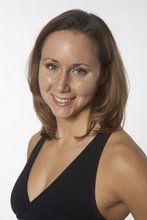This past Sunday on Good Morning America, a "nutritionist" was profiled giving her nutrition expertise to the public.
To read the full story, check out the link here:
What to Eat When: Foods for Slimming, Sleeping and Satisfying
The comments/recommendations made by this "nutritionist" (which, anyone can call themselves a nutritionist) including statements such as:
"Don't eat protein bars because most of them contain soy protein isolate which difficult to digest and can slow thyroid function"
"Don't feed kids pre-packaged fruit snacks, even if they're 100% fruit juice because they are laced with sugar which spikes your child's blood sugar levels"
"Don't drink diet soda because it is high-glycemic and will throw blood sugars off. Also, it is acid-forming and demineralizes bones"
"Don't eat fruit at night because it will 'sit' on top of slower digesting foods in the stomach and cause indigestion"
Now, these statements really ruffled the feathers of many (many) Registered Dietitians (RD). First they were upset that this woman claimed to be a nutrition expert, when they feel a Registered Dietitian is the true nutrition expert. Then, they were upset because she made statements about diet soda and protein bars that they feel is not accurate.
If you check out both GMA's website on this story and the ADA's Facebook page, you'll see the plethora of comments from RDs about how this story was so terrible and how this woman was not credentialed to give this information.
Well, here's my two cents about all of this:
First, yes, I would have to agree that it should have been a RD on the show giving nutrition information rather than a self-proclaimed "nutrition expert". After having gone through 12 years of nutrition education myself and a dietetic internship to become a RD, I do respect the training some RDs have in order to be qualified to give nutrition advice.
HOWEVER, keep in mind that the majority of the public thinks most RDs are idiots. Some RDs only repeat what they read in nutrition textbooks, but never take the time to learn the recommendations themselves by sourcing back to the originial researched information. In some cases, for example, with the recommendations for a low-fat, low/moderate protein diet to make everyone healthy (even diabetics), they'd see that the recommendation was never based on any hard and sturdy science. A low-fat diet is not the answer to everyone's nutrition problems. Yes, maybe for some people it is a good choice, but overconsuming carbs because protein will kill you and fat is evil is not helping our country's expanding waistline. And, there is loads of real science on the benefits of carb restriction.
The RDs who commented on this story felt that the recommendation to not consume protein bars because they contain soy protein isolate was absolutely wrong and inaccurate. They feel soy is a great food, and that it is not harmful at all.
Yet, there is mounds of research showing that isolated soy proteins may actually have negative health implications for bone and hormonal balance. Thus, it may be wise to not overconsume isolated soy, in bars or other products. However, soy as a whole food (as edamame) and fermented soy products like natto, have been shown to be healthy and are foods often consumed by Asian cultures for hundreds of year without harm. So, perhaps this statement made on GMA wasn't so terrible, but could have been stated in a different way. She could have said that when looking for protein bar to look for proteins from non-soy sources like whey protein, hemp protein, rice protein or nut and seed protein instead because the health effects of soy protein isolate are questionable.
Then, her statement about diet soda is not entirely accurate, but not completely out to lunch either. As I posted recently, artificial sweeteners have been shown to have similar effects on metabolism as sugar - meaning that they seem to elicit the same insulin response and thus, act in the same way as the food they are trying to replace. Thus, the statement made on GMA could have instead referenced this research showing that it's better to avoid all sweeteners -real or fake - beause of their potential to increase risk factors for diabetes. The fact that they are high-glycemic though is not correct. They don't raise blood glucose levels. Instead, they could be considered high-insulinemic. So, for RDs to defend this statement as completely wrong could be valid, but instead, they should have corrected it based on scientific research showing how artificial sweeteners may actually not be the answer to everybody's blood sugar problems.
Finally, the statement about fruit seems quite odd. I don't know of anything that would say this is true. Also, this advice doesn't really help the mounds of people that desire something sweet after they eat dinner. Rather than eating cake or other desserts, I think fruit is a much better option. The statement recommends vegetables, and that's good too, but I don't think many people are craving carrot sticks to help them curb a sweet tooth. Show some evidence for this rotting effect and I'd be more convinced.
Overall, GMA should know better than to use someone without any credentials to give advice to millions of people. There are very bright and talented RDs out there that have busted their butts to become the true nutrition experts. Yes, this woman may have some good ideas, but just like other people have commented: if you wanted to give out medical advice, you wouldn't have ask a self-proclaimed medical expert to be on the show. You would have asked a true medical doctor. Do the same for your nutrition recommendations.
I'd love to hear any of your thoughts. I wrote this on the fly before leaving for work this morning (and between bouts of morning sickness), so if you have anything more to add, that would be great.
Cassandra
Tuesday, August 11, 2009
Subscribe to:
Post Comments (Atom)
ROTATING_4+copy.gif)




15 comments:
Wow, food for thought. I would think it is hard to make nutritional recommendations to such a general audience as on a national tv show.
The fruit after dinner thing is part of the 'food combining' movement. Fro what I've read, they believe that fruit digests the quickest of all foods, therefore should be eaten first and not combined with any other food which could keep the digested fruit from leaving your body quickly. Quick elimination.
From the standpoint of easing digestion, it can be helpful to some people who experience bloating and difficult digestion, to not eat fruit after a normal size or heavy evening meal, and instead to eat it before the meal, or separately as a snack. Making this switch can be helpful.
On the soy isolate protein, how much do you feel is "safe" to use on a daily or weekly basis? Or would you recommend avoiding it altogether? I have been using it to make occasional shakes after weight workouts, because I try to follow a mainly vegan diet. I also sometimes use a protein bar that also contains the soy isolates.
Thanks for this post. I am not at all surprised by GMA getting this so called "nutrition expert". I stopped watching GMA when they had a so called "fitness expert" giving advice about exercise. It was so ridiculous, this so called expert was saying that women should not train with more than 5 lbs!
Thank you Jessica and Amy for the information about speed of digestion. However, do you know if this has ever been actually researched and proven? Don't you think it might depend on the person and their system and not be the same across the board?
Amy: If you're a vegan and need a great post-workout protein choice, why not try 70% hemp protein? It's a complete protein that doesn't have the hormonal side effects that soy has. See the link on my blog to learn more. There's also rice protein as another alternative.
For frequency: I'd limit it as much as you possibly can. There are a lot of bars out there without soy in them - they use rice or nut protein instead and taste very good.
Thanks Bernee! Great to know! I don't watch enough TV to know this... I live in a cave :)
No disrespect Cassandra but I'd trust a nutritionist more than an RD (apart from yourself) for the most part. Most RDs don't do their homework and just believe everything they are taught. I think the profession needs a big shake up.
Regarding soy - re Asians eating it with no probs - yes its fermented but I think the Asians also have good iodine levels and that is protective of any negatives from soy. Can't remember where I read this.
THanks for the real story on that, a lot of that info is packaged well enough that I'm sure plenty of people buy into it...
Funny thing, here's a similar article about this very same topic:
http://www.minnpost.com/healthblog/2009/08/04/10662/u_reviews_find_dangerous_pattern_in_morning_shows_health_coverage
Doesn't go into details like you do, but thought you mmight like it.
Hi Cassandra, from what I remember a lot of criticism about food combining is that there is no scientific proof behind it.
I agree with you (every body is different) and to see what works specifically for your body. I would much rather see someone eat some strawberries after supper than a handful of Oreos.
Sue: yes, that might be the case. Interesting.
Casey: thank you for that post! Very cool!
Jessica~: exactely. That's what I feel. But, each person is different, so it would be on a case basis.
Cass you are wonderful! I love your blog!
-marn
Cassandra, FYI, in Brownstein's book - Iodine - Why you need it - why you can't live without it:
At his office (Drs Brownstein, Nusbaum and Ng) tested and treated over 3,000 patients with iodine. Over 95% tested demonstrated low iodine levels.
The reason for so much iodine deficiency is due to inadequate iodine intake and exposure to toxic halides - bromine, fluoride and chlorine derivatives.
Thanks for the hemp protein idea, I will see if I can find it here in Belgium or get some next time we're in the US to try.
Yes, I agree - rather fruit after meals than no fruit at all, but for some people it really does make a big difference in how they feel to eat it before or alone.
Fruit on its own leaves the stomach as little as 30 minutes, while foods with starch or large amounts of protein can take 3-4 hours to move out of the stomach.
If I really really wanted good solid advice (for anything), I wouldn't catch it on the boob tube.
I'd spend time researching the topic online to get the best information. Heck, If I care enough about it, then I should be responsible enough to do a little reading.
can you explain when is a nutritionist overstepping their boundaries into the realm of an RD... for an example someone with a cscs and issn certification.
Hi from Argentina! Can I use this space to post a question? I am translating an article from an American magazine and I found "Ch.Forberg, R.D., nutritionist for NBC's..." Is an R.D.a doctor?
Does anybody know if "R.D" is "dietista" in Spaish? (A "dietista" is a M.D. here).
Interesting blog.
Thanks!
Hi Argentina
A R.D. is a registered dietitian. They are nutrition experts.
Best, Cassandra
Post a Comment